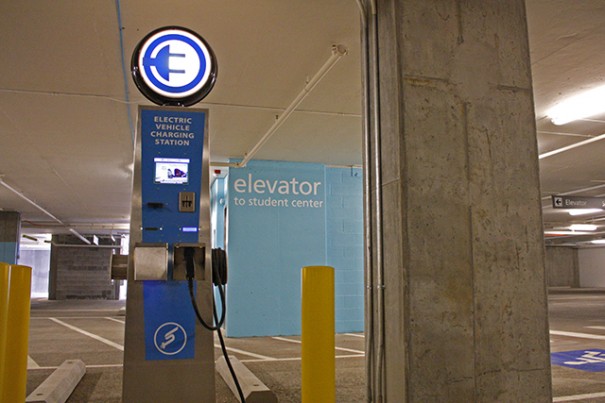This content was published: December 18, 2014. Phone numbers, email addresses, and other information may have changed.
Cascade parking garage increases campus parking capacity and reduces parking strain on surrounding neighborhood
Photos and story by Amy Mintonye

The parking garage features an electric car charging station and direct access to Cascade Hall and soon-to-open Student Union.
December 18, 2014
Beginning Winter Term 2015, the Cascade Campus underground parking garage will convert 150 spaces from the current pay-as-you-go model to the more familiar permit-style parking. The remaining 61 spaces in the underground garage will continue to function as pay-as-you-go spaces.
The parking garage, built with funds from the 2008 bond measure, is the first structure of its kind to be built on any PCC campus. The garage adds much needed parking spaces to the NE Portland campus without sacrificing precious space to an above ground lot. Its design was the preferred option by the citizen’s committee that guided the early planning work for the bond-funded improvements and is part of the college’s commitment to the neighbors and the City of Portland to reduce the number of college-related vehicles parking on local streets. A charging station for electric cars was also installed in the parking garage in compliance with the bond program’s commitment to sustainability.
When the garage opened in the Fall of 2014, all spaces were short-term, pay-as-you-go spaces. After closely monitoring usage during its first semester, the college has determined that permit parking spaces at Cascade are in high demand and the garage would be better utilized under the revised payment structure.
“We will continue to monitor parking usage in the garage and elsewhere on campus and make adjustments as necessary,” says Cascade Campus President Karin Edwards.
PCC’s 2008 voter-approved $374 million bond program is increasing opportunities for residents to access quality, affordable higher education close to where they live and work. Additional classrooms, updated equipment and technology, and advanced workforce training programs are helping to pave the way for future employment options. For more information, visit the bond website
